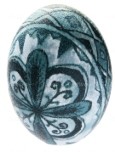Emu Eggs are Beautiful, and Good for You, Too!
I have a lot of people ask me, “Are there any health benefits to eating Emu eggs?” Sometimes, they tell me they look too beautiful to eat. But most importantly, they want to know if Emu eggs are healthy for you.
We sell Emu eggs here at Yoke Farms, which most people use for meals but some people end up incubating them to hatch their own Emu. No matter which camp you’re in, here’s a little more about what makes Emu eggs so remarkable.
How Emus Lay Eggs
Here’s a bit of mind-blowing trivia for you:
By the time a female Emu reaches 14-18 months, she’s ready to lay eggs. Emus follow seasonal patterns when it comes to egg-laying, usually in the winter months. During this time, one Emu will produce as many as 50 eggs!
Once Mama Emu lays the clutch of eggs, Daddy Emu is the one who incubates them (much like penguins do). The eggs are rather large, with the average egg being 9x13cm and weighing about 2 pounds. Over the 8-week incubation course, the eggs turn a rich green hue. During this time, Daddy Emu does nothing but fulfill his duty to the eggs. He doesn’t eat, drink, or even defecate. His only activity is turning the eggs 10 times a day, and ends up losing a third of his body weight as a result.
Are Emu Eggs Good for You?
One Emu egg is like 8-12 chicken eggs, so you can likely feed a whole family of four with just one! I wouldn’t recommend trying to eat one by yourself in one sitting.
Emu eggs have a unique composition: albumin, which is the main protein in human blood and is important to regulate blood pressure, makes up about 55.1% of the egg. The yolk accounts for 31.1%, and the shell is the remaining 12.8%. The high levels of biliverdin in the shell give it its unique green-blue color.
When compared with a chicken egg, Emu eggs have a lower proportion of water, a higher proportion of fat, and a similar proportion of protein. Similar to chicken eggs, Emu egg yolk has a typical concentration of cholesterol and fatty oleic acid and palmitic acid. They’re lower in Vitamins A, B1, B2, and B5, zinc, and manganese, but higher in selenium, magnesium, iodine, and iron.
Also similar to a hen’s egg, Emu eggs contain all eight essential amino acids. But unlike a chicken egg, the Emu yolk is paler and has a 30% higher concentration of lipid-protein. They’re much richer in MUFAs and PUFAs (fatty acids), which we covered in a previous blog post.
To recap, you need a balance of MUFAs and PUFAs in your diet, but most people struggle to get this balance. Eating an Emu egg is like taking a shortcut because you’re getting the entire Omega fatty acid chain in a single food.
Where to Find Emu Eggs for Eating, Incubating, or Crafting
Yoke Farms sells Emu eggs seasonally for your eating pleasure. If you place your order before we collect and refrigerate them, we may be able to send you a fertile egg for incubating. We sometimes have a waiting list for this, so we recommend contacting us directly for assistance or if it’s outside of breeding season.
We also ship Emu eggshells to artisans to use in a variety of crafting projects. The natural green-blue hue of the Emu egg makes for beautiful etched designs that actually reflect three different colors. This is natural color play due to the different layers of the shell, not because of paint or dye. The top layer is the dark, rich green-blue, while just underneath is a lighter inner layer, and deeper still is a thin white layer.
No matter how you choose to use Emu eggs, Yoke Farms has you covered. Contact us today to purchase an Emu egg or shop our collection online for quality Emu oil and other products.

